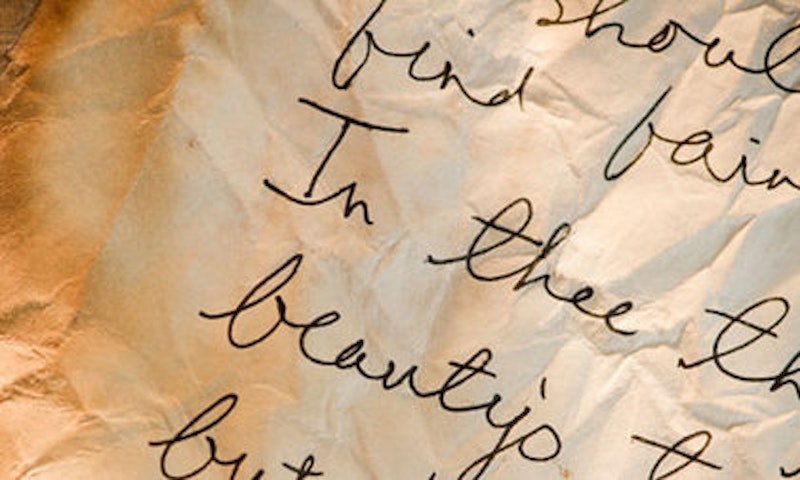Pay attention. To the things people say, and how they say them—to inflections, to insinuations, to negative spaces. Listen closely to everything atmospheric, natural, and mechanical, and drink it in, deeply.
Take notes. If you have an idea—or hear something that suggests one—stop whatever you're doing and write it down. If you don't, you might remember it, but then again, you might not… it could be gone, forever.
Not bothering to publish doesn't mean that you'll perish. There are perspectives afoot that failing to find favor with poetry publications means that a) you need to rethink your approach or b) poetry's just not that into you and you should give it up. This is bullshit that nobody should buy into, ever. I say this as someone whose luck with poetry publications has been worse than dismal (unless somebody asks me, my days of submitting stuff to places is pretty much over), and who nonetheless has a) a very, very small audience of people for whom the poetry I write is meaningful and fulfilling and b) has published actual books of actual poetry on actual paper.
Be too proud to beg. Sit down, and take a deep, cleansing breath. This is going to be as hard to hear as it is to say, and I take no pleasure in saying it, but here it is: do not beg people to buy or read your poetry. You can mention that you write it, but nothing more, unless the party or parties to whom you are holding forth demand, sincerely, to contemplate your etchings. Otherwise you run the risk of annoying everyone beyond all reasonable measure.
Hit the reading circuit. Yes. Do it. Go to some readings and read poetry—yours, and other people's. Most of what we do as poets is internal and cerebral, and occurs in the musty, confined spaces of our individual consciousnesses. It's silent, in a literal sense. When published, which, if you have been, awesome, we might imagine the reader to experience our work in a similar way. But adding volume brings the work into a public sphere and has the effect of revealing shades, nuances, and problems; if the poem you write in isolation is a theoretical solution, the reading of the poem in public is a gesture towards actualization. Plus, at readings, there's a chance you'll happen upon an audience for what you have to say.
Book learning isn't important, except when it is. English classes where you're forced to study and try your hand at authoring haiku, sonnets, limericks, and various other poetic forms are, for most of us, intrinsically boring. And while I do not look back upon those classes with much joy or fondness, I'm glad I had to take them, because they gave me an appreciation for the history of poetry and, in the process, a very definite sense of what I do not want the poetry I write or consume to be, or to contain. Remember: you have to understand a form or system in order to subvert it, emulate it, or elevate it.
Read continuously. Not poetry, necessarily: immersing yourself in the verse of others isn't a magic bullet. What I mean is read everything else: feature journalism, interviews, white papers, blog posts, listicles, novels, novellas, exposes, erotica, invoices, postcards, captions, warning labels, instructions, bathroom graffiti, ransom notes. There's no limit to the rhythms you can discover overtly or otherwise, the miracles that mis-readings can inspire, the linguistic revelations or reverberations you might stumble into, the myriad curiosities of region and dialectic you could discover. In this context, even bad literature is, potentially, a boon. Soak it all in, and hold on to what you think you need, even if you're not sure how or when you'll need it.
Don't expect anybody to care, but don't let that stop you. As I hinted at above, very few people are likely to care about your poetry, even if those people like you or are related to you. There is a good possibility that even if they take the time to read your poetry, they won't get it or find it as you find it. What matters to you doesn't matter to them: they care about reality television, Hollywood gossip, fantasy sports leagues, their careers, whatever their kids are doing. That's life; that's reality. What you need to remember—and this is just really important, maybe the most important thing for you to take away from this article—is that you've probably yet to meet the readers who will embrace you.
—Raymond Cummings is the author of several books of poetry, including Crucial Sprawl, Seven New Poems, and Assembling the Lord. He blogs infrequently at Voguing to Danzig (http://voguingtodanzig.blogspot.com/).

